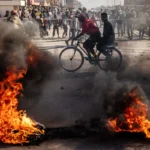One of South Africa’s most prestigious and historically significant universities, the University of Fort Hare, has suspended all academic and administrative activities indefinitely following violent student unrest that resulted in multiple buildings being set ablaze. The university, located in Alice, Eastern Cape, announced the shutdown on Thursday after petrol-bomb attacks gutted several key facilities, including the main administration block and the student affairs offices at its Alice Campus.
According to university officials and the South African Police Service (SAPS), no fatalities were recorded during the chaos, though two students were reportedly injured during clashes with campus security officers. The unrest, which has thrown the university community into turmoil, stems from mounting student anger over recent changes to student governance structures and growing calls for the removal of Vice-Chancellor Professor Sakhela Buhlungu.
Videos circulating on social media showed towering flames and thick smoke billowing from campus buildings as emergency responders rushed to contain the inferno. The footage has sparked outrage nationwide, as South Africans mourned the destruction of an institution deeply intertwined with the country’s anti-apartheid legacy and political history.
Founded in 1916, the University of Fort Hare has long been regarded as the cradle of African liberation movements. Its alumni include some of Africa’s most iconic leaders among them Nelson Mandela, Robert Mugabe, and Seretse Khama who developed their political consciousness within its halls. The university’s reputation as a hub for progressive thought and resistance makes the current wave of violence particularly symbolic and concerning.
In an official statement, Professor Buhlungu condemned the “large-scale destruction of property,” describing it as part of a broader pattern of “sponsored violence and criminality” aimed at destabilizing the institution. He said the attacks went beyond legitimate student grievances and were the work of individuals seeking to exploit unrest for ulterior motives.
“The destruction of university property is not an act of protest it is an act of sabotage against our shared future,” Buhlungu said, urging calm and dialogue while confirming that the university would remain closed until further notice.
University management issued an evacuation order instructing all students to vacate the premises by 1700 local time (1500 GMT) on Thursday, citing safety concerns and the need to prevent further escalation. “The actions of a few have endangered the lives and safety of the broader university community,” the institution said in a statement. “We must now prioritize security, assessment of damage, and restoration of calm before resuming academic operations.”
Police spokesperson Siphokazi Mawisa confirmed that at least four buildings had been set on fire during the protests and described the situation as “tense but under control.” She said that police reinforcements had been deployed to monitor the campus and surrounding areas, adding that no arrests had yet been made.
Despite the university’s shutdown and the police intervention, students have vowed to continue their demonstrations until their demands are met. Student leader Asonele Magwaxaza told state broadcaster SABC that students were “angry and frustrated” by what they described as management’s arrogance and refusal to address their grievances.
“The student governance has been suppressed and compromised,” Magwaxaza said. “We have written to the council and the management, but they have ignored us. They are not listening, and now students are taking matters into their own hands.”
Tensions at the University of Fort Hare have been brewing for months, with students accusing the administration of eroding democratic processes within student leadership and failing to address issues related to accommodation, funding, and academic policy. Analysts say the crisis highlights deeper structural challenges in South Africa’s higher education system, where frustration over inequality, poor governance, and limited opportunities often boil over into campus unrest.
The incident has reignited national debate over how universities manage protests and balance institutional discipline with the right to student activism. Education observers have also voiced concern that continued instability could jeopardize the university’s upcoming examinations and its long-standing reputation as a center of intellectual excellence.
As cleanup operations begin and investigators assess the extent of the damage, many South Africans are calling for calm, dialogue, and accountability. For now, the University of Fort Hare, once a beacon of African empowerment finds itself at a crossroads, struggling to restore order and protect its century-old legacy from the flames of discontent.














Leave a comment